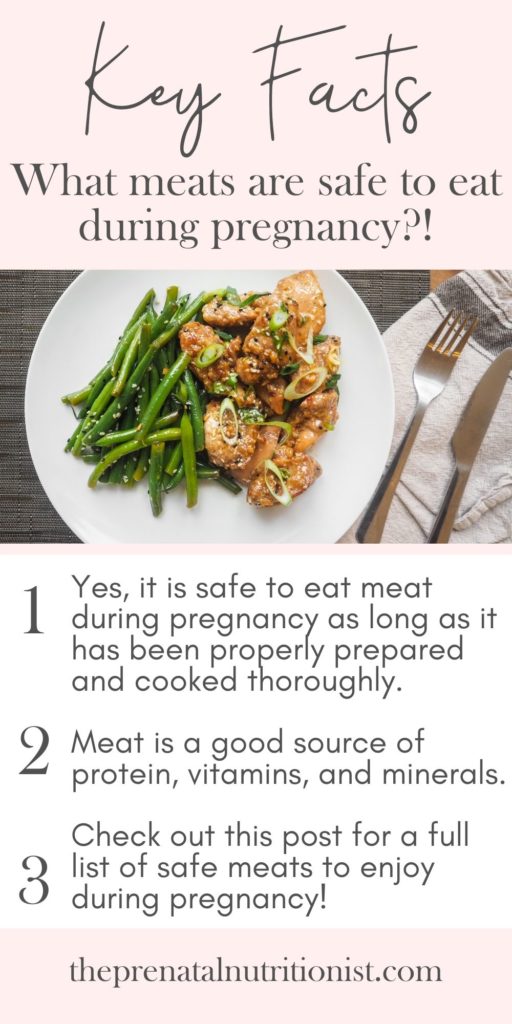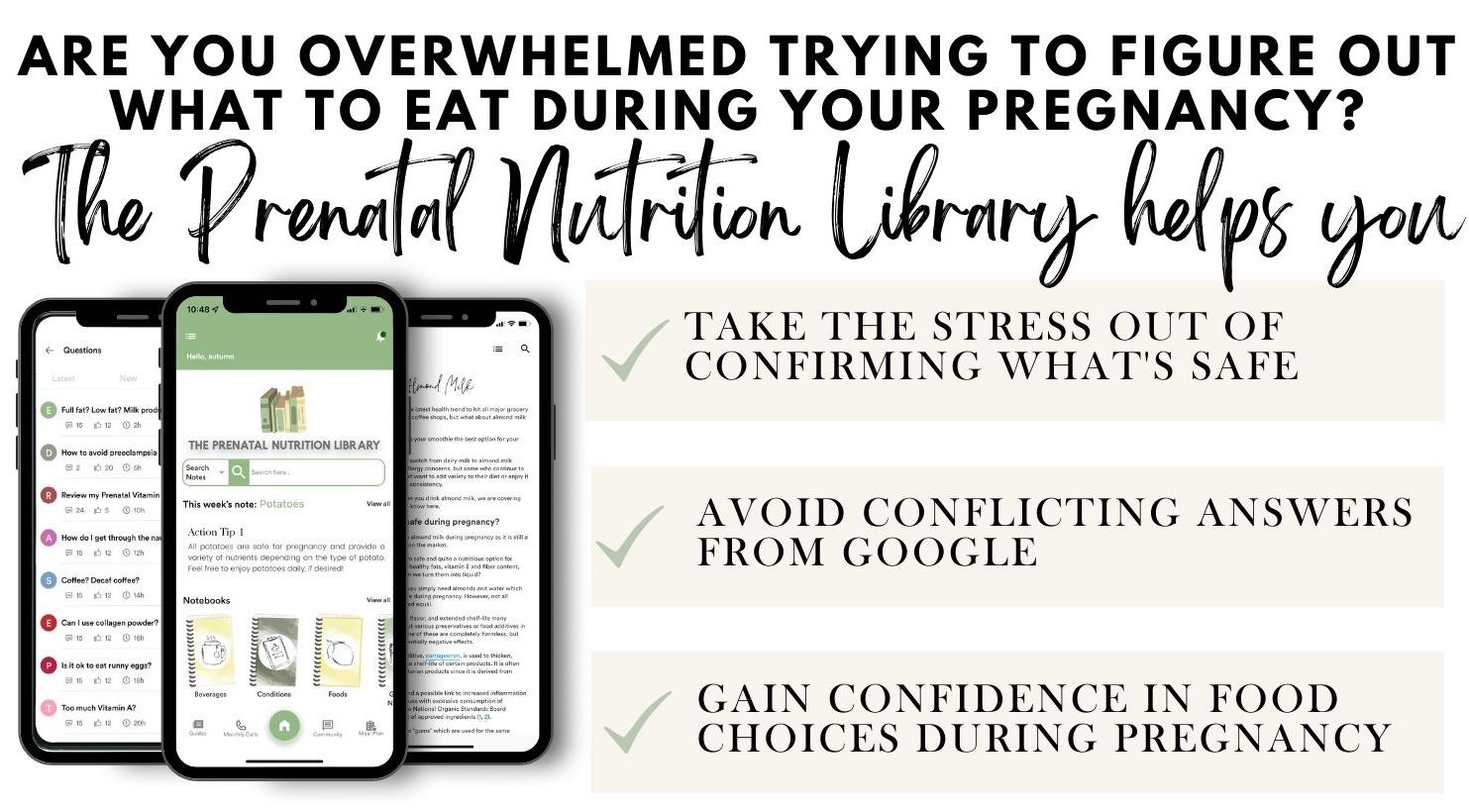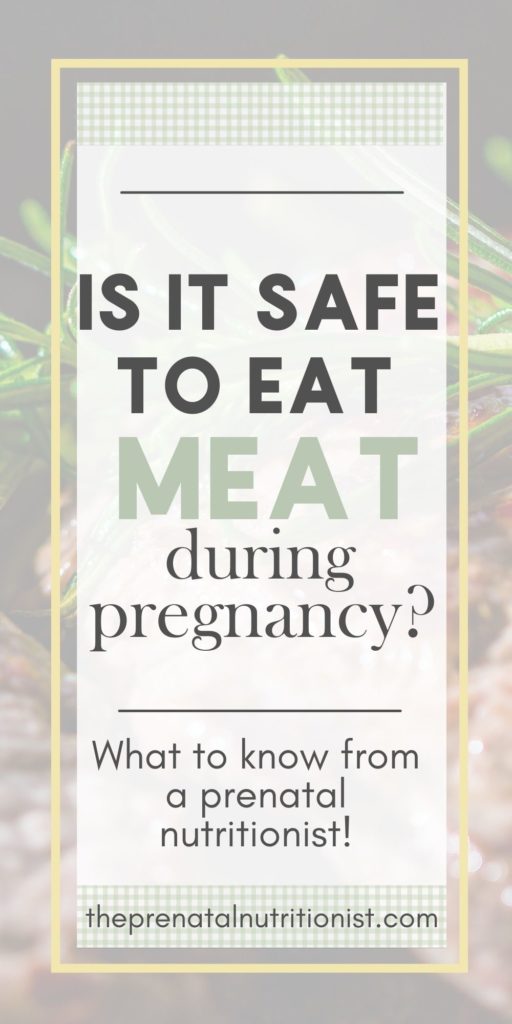
Eating a variety of whole foods, including meat, fruits, vegetables, dairy products, cooked eggs, and more, is key during pregnancy. Eating various foods gives pregnant women and their babies plenty of important nutrients for a healthy pregnancy.
Most foods are safe to eat during pregnancy. There is not a mile-long avoid list, but there are some foods that can potentially cause harm to expecting mothers and their unborn babies. To help you know which foods to avoid and which to eat, I’m dedicating this post to discussing whether meat is safe during pregnancy.
Is It Safe To Eat Meat During Pregnancy?
Yes, it is safe to eat meat during pregnancy as long as it is properly prepared and cooked thoroughly to avoid food poisoning. As we’ll learn below, properly cooked meat is a key part of a healthy pregnancy diet. It’s a high-quality source of protein, fats, vitamins, and minerals.
However, raw and undercooked meat should be avoided during pregnancy. All meats, such as ham and corned beef, chicken, beef, and seafood, should be cooked before eating. Raw and undercooked meats could pose a significant risk to pregnant people and their unborn babies.
Meat that isn’t prepared properly can contain harmful bacteria that cause salmonella infection, toxoplasmosis, an infection called listeriosis, and other illnesses. These conditions are especially dangerous during pregnancy when the expectant mother’s immune system isn’t as strong as usual. Let’s dive into 4 of the best meat options for pregnancy and why the have many benefits for both you and baby.
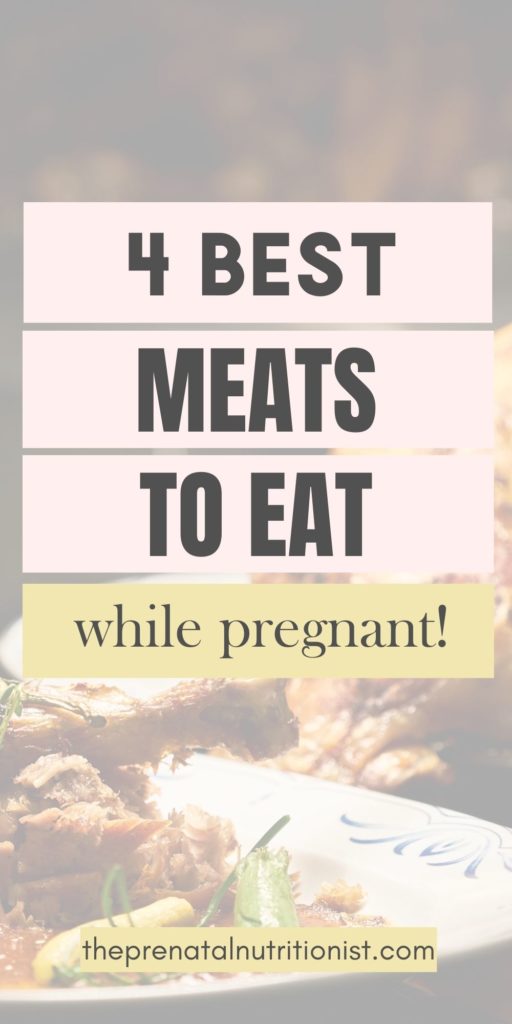
Best Meat To Eat During Pregnancy
Beef
Beef is an excellent source of protein for pregnant women. It’s also rich in iron, choline, and vitamin B12, all of which are important during pregnancy.
Beef is actually one of the best sources of iron. Iron is an essential nutrient for pregnant people at all stages of pregnancy. More iron is needed as blood volume increases and needs jump significantly during pregnancy. The iron in beef is heme iron, the most absorbable form.
Iron is important throughout all trimesters of pregnancy. The recommended iron intake for pregnant people is 27 mg per day. A lack of iron can cause iron deficiency anemia, which puts the baby at a greater risk of low birth weight and other complications.
Making red meat, like beef, a regular part of your pregnancy diet is a good way to increase the nutrients you get in pregnancy. In addition, while many nutrients are comparable in red and white meat, there are significantly more vitamin B12 and higher amounts of iron and zinc found in red meat.
Beef Liver
For even more of an iron and nutrient boost, try beef liver. It’s a good source of iron and one of the most concentrated sources of folate. Consuming adequate amounts of folate during pregnancy helps to prevent neural tube defects in the unborn baby.
There are about 215 mcg of folate per 3-ounce serving of beef liver. This type of red meat also offers a good amount of protein and loads of vitamin A, vitamin B12, and copper. Stick to moderate amounts of liver during pregnancy because it is possible to get too much vitamin A, but this really only happens with too much vitamin A (retinol) supplementation. If you’re open to trying beef liver or other types of organ meat, I recommend checking out my post, “Is Organ Meat Good For You?” Learn more about red meat for pregnancy inside The Prenatal Nutrition Library, where we break down the research and dispel the “red meat is bad for you” myth. We also dive into why liver is one of the best foods you can eat during pregnancy. You can also try types of pâté including Pâté Maison and Pâté Hénaff.
Pork
Pork is another great option for pregnancy. It’s a great protein, B vitamins, zinc, and iron. Food safety and awareness are key. This is true for all foods! Below are a few precautions to be aware of before eating pork.
In addition to the foodborne illnesses mentioned above, consuming raw or undercooked pork puts pregnant people (or anyone) at risk for trichinosis. Trichinosis is a foodborne illness caused by a parasite that can live in certain types of meat, including pork.
Trichinosis infection can be very serious, but it’s rare. There are fewer than 20 isolated cases of trichinosis infection per year in the United States. The best way to prevent a trichinosis infection, or any foodborne illness from pork, is to cook the meat to a minimum internal temperature of 145 ℉ before eating it.
There are a lot of ways for pregnant people to enjoy pork safely. The following kinds of pork are usually cooked thoroughly and served hot, as per the food safety recommendations for pregnancy:
- Pulled pork
- Boiled pork
- Pork roast
- Pork ribs
- Bacon
- Pork chops
- Pork tenderloin
- Pork sausages
Processed Meats
Keep in mind that different cuts of pork offer slightly different nutritional value. I’m often asked about the safety of bacon and sausage. Bacon and sausage are considered “processed meats.” Both are safe options for pregnant women as long as they are fully cooked. As with most food during pregnancy, moderation and variety are key. Both bacon and sausage are great sources of glycine, an amino acid that becomes conditionally essential during pregnancy, meaning we must get it from our diet.
Pork that is not cooked to 145 F should be avoided. It’s also important to remember that food should not be sitting out longer than 2 hours or longer than 1 hour on a hot day. If you’re at a summer BBQ that is serving pulled pork, pass if it’s been sitting out for longer than this amount of time.
Poultry
The most popular poultry choices tend to be chicken and turkey. These are also healthy meat options for pregnancy.
Poultry is a fantastic source of protein and essential vitamins and minerals. Nutrients will vary slightly depending on the cut and type of poultry you’re eating. In general, poultry is a great source of vitamin B3 or niacin. Niacin may play a role in preventing miscarriage and some birth defects. Poultry also provides vitamins A, E, B6, zinc, iron, and selenium.
Eating chicken skin provides the added benefit of glycine. This is the conditionally essential amino acid we mentioned above. Glycine is needed to create your baby’s DNA and collagen.
Of course, like with red meat and pork, poultry should be properly prepared and cooked thoroughly (to at least 165 ℉) to avoid potentially harmful foodborne illnesses. Turkey and chicken in the form of deli meat can also be a safe option for pregnancy. Best practice recommends heating deli meat “steaming hot” (165 ℉) before eating.
Seafood
By some definitions, seafood is considered “meat.” By other definitions, only land animals are classified as meat. Either way, seafood is another great source of important nutrients for pregnant people and their growing babies. Fish and shellfish contain good amounts of protein, iodine, selenium, iron, and zinc. Many fish, including salmon, contain omega-3 fatty acids, specifically docosahexaenoic acid (DHA). DHA plays an important role in a baby’s brain and vision development.
Seafood is a nutritious part of the pregnancy diet, but some types contain high levels of mercury and should be avoided. If you are pregnant or trying to become pregnant, avoiding sharks, swordfish, king mackerel, and bigeye/ahi tuna is best.
Try to eat at least 2-3 servings of low-mercury seafood per week. Seafood can be enjoyed baked, fried, grilled, or you can even try smoked seafood. You will want to avoid raw shellfish during pregnancy. Fish contains so many important nutrients that are needed in higher amounts during pregnancy.
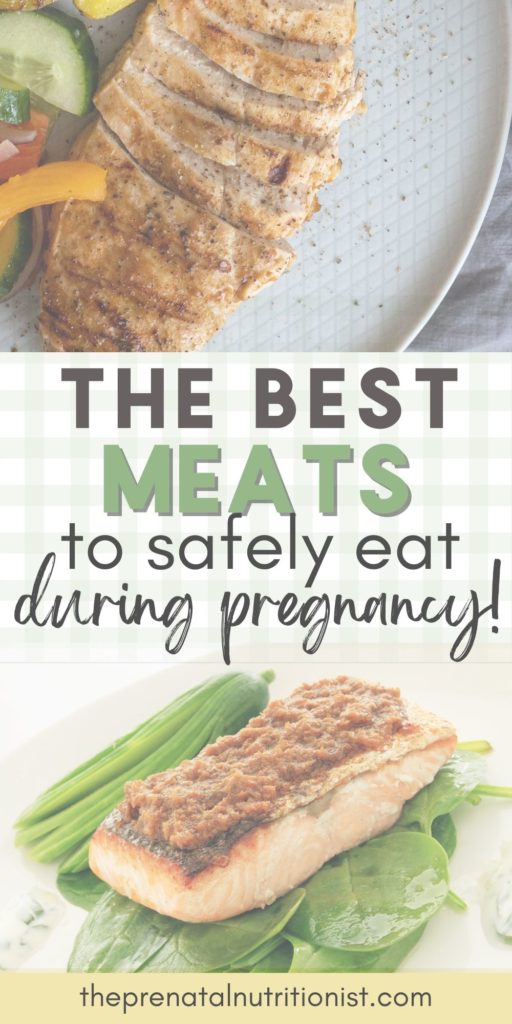
Rest assured, meat is a recommended food for pregnancy!
We highly encourage the consumption of meat during pregnancy. Meat is filled with important and highly absorbable forms of multiple nutrients. If you or someone you love is pregnant and wondering whether they can still enjoy the meat they love, the quick answer is yes. Just remember, food safety is key.
To learn exactly what foods are safe to eat during pregnancy and foods to avoid during pregnancy, join The Prenatal Nutrition Library (TPNL). We answer common questions like, “Can I eat raw eggs?”, “Can I drink energy drinks?”, “Are grapes safe for pregnancy?”, “Should I avoid raw sprouts?”, “Can I eat soft cheeses such as brie?”, and more!! Hundreds of guides on nutrition topics for all stages of pregnancy are just a click away! TPNL also has trimester-specific meal plans, so you don’t have to figure out what to eat every week, and you will know the baby is getting the nutrients they need. Click here!
